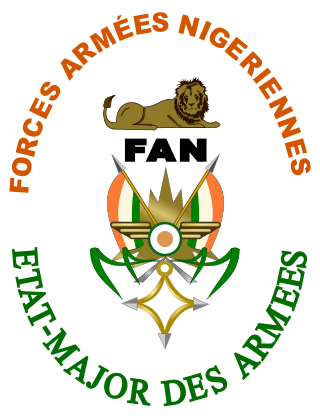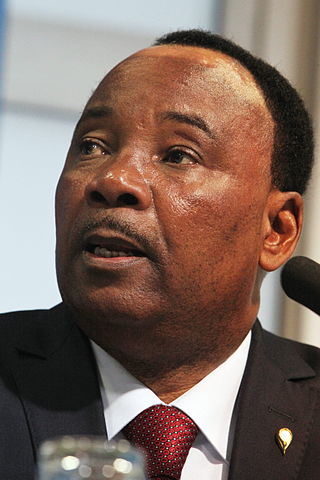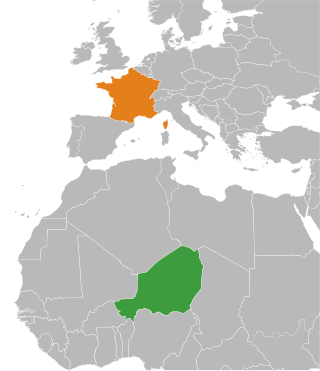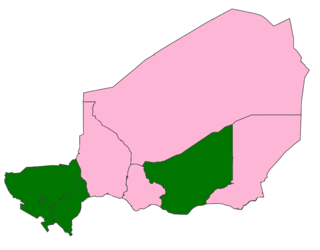| Battle of Ouraren | |||||||
|---|---|---|---|---|---|---|---|
| Part of Jihadist insurgency in Niger | |||||||
| |||||||
| Belligerents | |||||||
| | | ||||||
| Strength | |||||||
| Unknown | 20~ | ||||||
| Casualties and losses | |||||||
| 1 | 1 | ||||||
The Battle of Ouraren was fought between Niger and al-Qaeda in the Islamic Maghreb on 12 June 2011.
| Battle of Ouraren | |||||||
|---|---|---|---|---|---|---|---|
| Part of Jihadist insurgency in Niger | |||||||
| |||||||
| Belligerents | |||||||
| | | ||||||
| Strength | |||||||
| Unknown | 20~ | ||||||
| Casualties and losses | |||||||
| 1 | 1 | ||||||
The Battle of Ouraren was fought between Niger and al-Qaeda in the Islamic Maghreb on 12 June 2011.
On June 12, 2011, in Ouraren, 80 kilometers from Arlit, a patrol of the Nigerien National Guard surprises a group of fighters who had come from Libya, with three stationary pick-up trucks. [1] [2]
The skirmish results in one casualty on each side, with 6 military personnel injured. The Nigerien forces seize one of the three pick-up trucks, loaded with 640 kg of explosives and 435 detonators. Additionally, they discover military uniforms and $90,000 in cash. The other two vehicles flee, pursued by the Nigerien forces. [1] [3]

The Niger Armed Forces includes military armed force service branches, paramilitary services branches and the National Police of Niger. The Army, Air Force and the National Gendarmerie are under the Ministry of Defense whereas the National Guard and the National Police fall under the command of the Ministry of Interior. With the exception of the National Police, all military and paramilitary forces are trained in military fashion. The President of Niger is the supreme commander of the entire armed forces. The National Assembly of Niger passed a statute for the Army of Niger in November 2020, planning for the army's size to increase from 25,000 personnel in 2020, to 50,000 in 2025 and finally 100,000 in 2030.

Mahamadou Issoufou is a Nigerien politician who served as the president of Niger from 7 April 2011 to 2 April 2021. Issoufou was the prime minister of Niger from 1993 to 1994, president of the National Assembly from 1995 to 1996, and a candidate in each presidential election from 1993 to 2016. He led the Nigerien Party for Democracy and Socialism (PNDS-Tarayya), a social democratic party, from its foundation in 1990 until his election as president in 2011. During the presidency of Mamadou Tandja (1999–2010), Issoufou was the main opposition leader.

The Gendarmerie Nationale is the national gendarmerie of Niger. The Gendarmerie Nationale are under the Niger Armed Forces and report to the Ministry of Defense. They are responsible for law enforcement in rural areas. Niger's civilian police force, the National Police, is a separate agency under the Ministry of Interior, Public Safety and Decentralization, and are responsible for policing in urban areas.
The Nigerien's Movement for Justice is a largely ethnic Tuareg militant group based in northern Niger. However the group also includes other nomadic ethnicities within this area, such as the Toubou and the Fulani. These groups have been battling the Niger government since 2007.
Tezirzaït is a village in the Aïr Massif of northern Niger. Tezirzaït is the prime village of the Tezirzaït Valley, which forms the northern edge of the Tamgak Massif in the center-east Aïr Massif. The village is bordered on the north by the Temet massif, and runs out into the Tenere Desert and past the Chiriet massif on the east. It was twice the scene of heavy fighting during the Tuareg Rebellion. The village is the site of an oasis, a small Kel Owey Tuareg village, and nearby archeological sites, including rock carvings and neolithic graves.

France–Niger relations are the foreign relations between France and Niger. Their relations are based on a long shared history and the more than sixty year rule of Niger by the French colonial empire, beginning with the French conquest in 1898. Niger obtained independence from France in 1960, and a history of French influenced culture and French language have been a point of commonality in the creation of a distinctive Nigerien culture from the diverse pre-colonial nationalities which make up modern Niger. France benefited economically from their time as a colonial power, and still relies on imports from Niger for elements of their economy.
Rhissa Ag Boula is a Nigerien Tuareg politician and former leader of rebel factions in both the 1990–1995 and the 2007–2009 Tuareg based Insurgencies. He was Nigerien Minister of Tourism from 1996–1999, and again from 1999–2004. His arrest on murder charges in 2004 precipitated armed conflict between his supporters and the Niger government. A political leader following the 1995 peace, he again joined a rebel faction from abroad in 2007, creating his own faction from abroad in 2008, and joining the peace process in 2009. In 2010 he was again arrested after returning to Niger.
The 2017 Ayorou attack occurred on 21 October 2017 when armed militants from the Islamic State in the Greater Sahara attacked a Nigerien military outpost in the village of Ayorou in southwestern Niger, killing 13 gendarmes. Occurring just weeks after a similar attack in the area killed four American and four Nigerien troops, the attack was carried out by ISGS gunmen who crossed the porous border from Mali.

General elections were held in Niger on 27 December 2020 to elect the President and National Assembly. With incumbent president Mahamadou Issoufou stepping down following his two terms constitutional limit, new presidential candidates competed for office. As no presidential candidate received a majority of the vote on the first round, a second round was held on 21 February 2021. The ruling Nigerien Party for Democracy and Socialism (PNDS) candidate Mohamed Bazoum was declared the winner, beating Mahamane Ousmane in the second round with 56% of the vote. In the National Assembly elections the PNDS won 79 of the 166 seats, falling just short of a majority.

The 2021 Nigerien coup d'etat attempt occurred on 31 March at around 3 am WAT after gunfire erupted in the streets of Niamey, the capital of Niger, two days before the inauguration of president-elect Mohamed Bazoum.
The Ménaka offensive was a series of offensives launched by the Islamic State in the Greater Sahara against the Malian Army, Tuareg self-defense groups including the Movement for the Salvation of Azawad (MSA) and Imghad Tuareg Self-Defense Group and Allies (GATIA), and the al-Qaeda-aligned Jama'at Nasr al-Islam wal Muslimin. The offensives took place in the Ménaka Cercle, in southeastern Mali.
The Battle of Adrar Bouss was fought on 15 September 2011 between the armed forces of Niger and Al-Qaeda in the Islamic Maghreb.
Abdou Aïssa, nom de guerre Sultan Ould Bady, is a Malian jihadist and drug trafficker. He co-founded the Movement for Oneness and Jihad in West Africa (MOJWA) with Hamada Ould Mohamed Kheirou and Ahmed al-Tilemsi, and founded Katibat Salahadin, a katiba within MOJWA that later reformed in the Islamic State in the Greater Sahara after Bady defected.
On November 8, 2013, clashes broke out between Malian forces and the National Movement for the Liberation of Azawad (MNLA) in Amazragane, Ménaka Region, Mali.
On September 11, 2013, clashes broke out between Malian forces and National Movement for the Liberation of Azawad (MNLA) fighters at a camp near the village of Fooïta, near the Mauritanian border. The battle was the first conflict between the Malian government and MNLA since the signing of the Ouagadougou Agreement.
On January 8, 2011, French and Nigerien commandos attempted to retrieve two French nationals taken hostage by AQIM militants in Niamey in Niger, and who were subsequently brought into the desert near Tabankort in Mali. Both hostages were killed during the botched rescue operation, along with three Nigerien soldiers and four kidnappers. The rescue operation's failure sparked controversy in France as it was reported that one of the hostages was killed by French gunfire.
Between October 9 and 10, 2014, jihadists from al-Mourabitoun were ambushed by French forces near Tchibarakaten, Niger while transporting supplies from Libya to Mali.
Between May 31 and June 1, 2017, clashes broke out between Nigerien forces and the Islamic State in the Greater Sahara (ISGS) near Abala, Niger. These clashes expanded to the Nigerien-Malian border near Bani-Bangou, and on June 1 the ISGS militants were confronted by French, Malian, and Tuareg militias when the militants fled towards Ménaka Region, Mali.
The Benin–Niger Crisis is an ongoing diplomatic crisis that was triggered by the coup d'état in Niger in July 2023, which overthrew elected Nigerien President Mohamed Bazoum and installed a military junta in its place. In response, the Economic Community of West African States (ECOWAS) imposed diplomatic and economic sanctions against the new Nigerien authorities, which including border closures. Although most of these sanctions were lifted by February 2024, the ruling military maintained border closures and economic sanctions with Benin in addition to conflicts arising from illegal crossings into Benin from Niger. These in turn led to deteriorating relations and security between the two countries in addition to mutual economic downturn.
On July 1, 2019 Islamic State in the Greater Sahara militants attacked the mining town of Inates, Tillabéri Region, Niger, killing eighteen Nigerien soldiers.